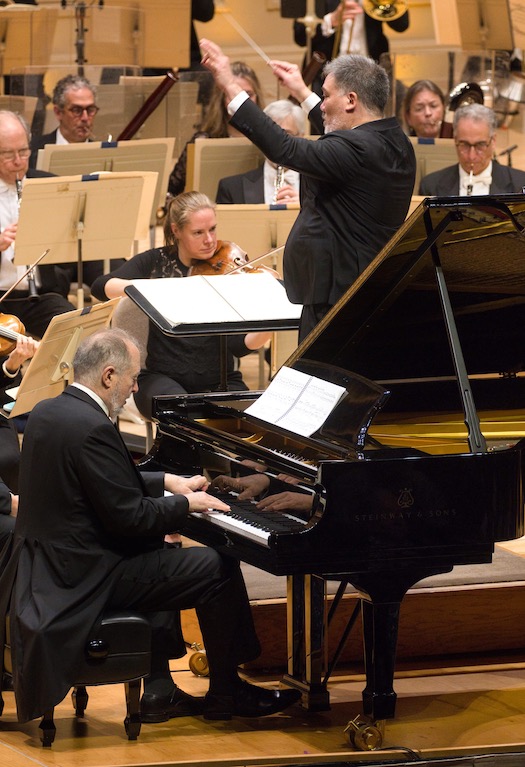
Garrick Ohlsson performed the world premiere of Justin Dello Joio’s Oceans Apart with Alan Gilbert conducting the Boston Symphony Orchestra Thursday night. Photo: Hilary Scott
Though the Boston Symphony Orchestra didn’t advertise it as such, Thursday night’s concert with Alan Gilbert at Symphony Hall was essentially an evening of premieres. There was, for one, the unveiling of a brand-new piano concerto by Justin Dello Joio.
Alongside that world premiere came the first BSO subscription concert performances of Lili Boulanger’s D’un Matin de printemps and Wilhelm Stenhammar’s Serenade in F. Antonín Dvořák’s Carnival Overture—played in anachronistic fashion at the end of the night instead of its beginning—was the evening’s only chestnut.
Perhaps the program’s general unfamiliarity helps explain why, on Thursday, the paying public kept their distance from the House on Huntington. Or maybe it was the soggy weather. Either way, for one of the few Thursday nights this season, banks of seats in Symphony Hall were noticeably vacant.
A cynic might call this a kind of vindication for the Dello Joio. Then again, one might read too much into the composer’s program note for his concerto, Oceans Apart. Yes, he concedes, the twenty-minute-long score is driven, in part, by worries about the day’s social and political divisions as well as the apparent demise of art music as a part of the broader cultural landscape. At the same time, numerous gestures (including, hauntingly, the last one) sound a lot like seagulls cawing across the waves.
For all its contemporary concerns, what goes on in the piece, musically, is rather conventional. Disparate materials—pitch-less violin noodling, breathy woodwind clusters, swirling piano lines— occupy their individual spaces. Gradually they transform and coalesce; at one point a full-blown tune emerges and the soloist and orchestra are, briefly, united.
But their concord doesn’t last. The line implodes and the concerto ends as desolately as it began. Taken together, this is basically the stuff of much symphonic composition these last fifty or more years, one in which any sense of triumph or definitive resolution is ultimately undercut.
Yet Oceans Apart rises above the mundane for various reasons. Chief among them are Dello Joio’s keen ear for instrumental sonorities, as well as his rigorous attention to issues of thematic development and strong grasp of structure.
Indeed, the latter qualities run hand-in-hand: the music’s aleatoric orchestral figures all serve particular expressive purposes and aren’t overused. Moreover, their broader shapes are subtly woven into the concerto’s notated proceedings. Accordingly, the relationship between the two types of music is at once apparent to the ear but shrouded in a certain degree of mystery. This makes for compelling musical rhetoric.
At the same time, Dello Joio’s scoring consistently holds the imagination. Oceans Apart fairly brims with captivating sounds: ominous percussive rumblings; eerie, stratospheric string lines; unsettling, muted brass swells among them.
Astonishingly, on Thursday, none of it covered Garrick Ohlsson’s account of the daunting solo part. Of course, the pianist—for whom Oceans Apart was written—is a bear of a man and his keyboard playing commensurately bold. Even so, Gilbert, a crackerjack purveyor of new music in his own right, presided over an orchestral accompaniment that was conspicuous for its blend of discretion, textural lucidity, and dancing energy.
For his part, Ohlsson navigated the thickets of Dello Joio’s keyboard writing with aplomb. While much of Oceans Apart is decidedly dense and abstract, the motoric solo line alludes boldly to some of its dedicatee’s specialties, particularly composers like Beethoven, Liszt, Rachmaninoff, and Scriabin. The pianist dispatched these moments with evident relish, as he did the score’s clangorous denouement.
Given the Dello Joio’s complexities (and the amount of rehearsal time it likely ate up), one would have been willing to excuse a bit of flabby playing from the BSO over the rest of the night. Yet there was very little of that, which speaks to the special rapport Gilbert and the orchestra share.
To be sure, there were only a couple of tentative moments in Stenhammar’s 1919 revision of his lovely, slightly overlong Serenade, which the orchestra had only played once before at Tanglewood. Otherwise, Thursday’s was a crisply engaged reading, one that overflowed with character and atmosphere, especially in the swaggering rhythmic sections of the Scherzo and the BSO’s clean-textured account of its charming finale.
In Boulanger’s short curtain-raiser, Gilbert balanced the music’s episodes of limber radiance and sweet sumptuousness with a knowing hand. His Dvořák, too, knew just what it needed to do, offering no shortage of technicolor thrills in its outer thirds and beguiling tenderness over the lyrical midsection.